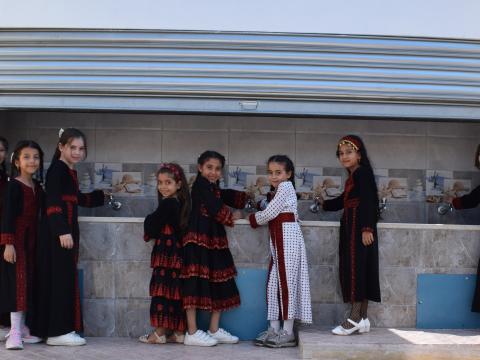Quality education starts with clean water and sanitation

During a hot afternoon, the students at a primary school in the Tubas governorate burst loudly and joyfully into the yard from their classrooms for recess. A group soon forms around the newly installed taps where they drink to quench their thirst, protected by sunshades from the intense May sun. As they enjoy the cool, clean water, most of them probably recall that just a few weeks ago, using the water fountain was a far less enjoyable and safe experience.
The water and sanitation facilities in this school were once in a very deplorable state. “It gets extremely hot here during summer. We need to drink a lot, and there were never enough water taps for all of us” explains Hoor, a 10-year-old student. Hana, the school's principal, corroborates her assessment. "Our school caters to 271 students from grades 1 to 4, along with 10 teachers. However, we only used to have two water taps for the entire school population."
And the low number of taps was not the worst problem. “We used to pay approximately US$75 every month for the management of the wastewater but we were not connected to the sewage system and there was little we could do” says Hana. As students and teachers struggled with the unhygienic conditions, the unpleasant smells and health hazards used to dampen their spirits and limit their ability to focus on their studies. "Our classrooms always had a foul smell, which never motivated us to attend school," explains Hoor.
Access to water, sanitation, and hygiene services in schools is crucial to ensure equitable access to quality education for all students. Well-maintained water and sanitation facilities, coupled with effective wastewater management, have a tangible impact on students' health and nutritional well-being as it protects them against diseases and dehydration. Beyond health and nutrition, a study conducted by World Vision has revealed that one-third of Palestinian students (42% among girls) avoid using toilets or drinking from school faucets primarily due to foul odours, cleanliness issues, and maintenance problems. The study further demonstrates that this behaviour leads to increased absenteeism, especially among girls, and negatively affects academic performance, contributing to higher dropout rates. Out-of-school children are subsequently at a higher risk of child labour or early marriage. Regrettably, a significant number of schools in Area C of the West Bank suffer from inadequate wastewater management and lack of connection to sewage systems due to resource limitations, poor infrastructure, and insufficient space.
Fortunately for Hoor and her friends, a few weeks ago, the water, sanitation, and hygiene (WASH) facilities at their school underwent rehabilitation and improvement, including connection to the sewage system. This transformation was part of the project "Building resilience and ensuring protective hygiene in WASH and Disaster Risk Reduction (DRR) systems at the school level in Area C" implemented by World Vision and the Palestinian Hydrology Group, with the financial support of the German Federal Ministry for Economic Cooperation and Development (BMZ). Since 2021, in partnership with the Ministry of Education, 383 sanitary units in 50 schools have been rehabilitated through the project, 16 of which were made accessible for children with disabilities. Furthermore, the project involved the rehabilitation or construction of 111 taps in 15 schools, along with the installation of water tanks in 60 schools. As a result, over 13,000 students and 1,000 teachers now have access to improved and more hygienic water and sanitation facilities.
In Tubas, the impact of this rehabilitation on the school and its students has been truly remarkable. The once noxious and unsanitary environment has given way to cleanliness and hygiene. "The project installed a 200-meter pipe system to connect the school to the sewage system. Being connected has not only positively impacted our school budget but has also created a healthier environment for our students. We now also have an adequate number of taps for everyone, complete with sunshades to shield them from rain and sunlight." Says Hana. "Now, it feels much safer to use the toilets or drink water from the taps. And finally, I can play with my friends during breaks without enduring unpleasant odours" concludes Hoor.